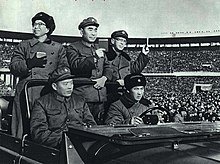This is an old revision of this page, as edited by SCreditC (talk | contribs) at 06:05, 29 December 2024 (←Created page with ''''Smashing gong-jian-fa''' ({{lang-zh|s=砸烂公检法|t=砸爛公檢法|p=}}), or '''smashing the Police, the Procuratorate and the Court''', was a movement launched during the Chinese Cultural Revolution (1966–1976) with the support of Mao Zedong.<ref name=":0">{{Cite journal |last=Leng |first=Shao-chuan |date=1981 |title=Criminal Justice in Post-Mao China: Some Preliminary Observations |url=https://www.jstor.org/stable/653598 |journal=The Chi...'). The present address (URL) is a permanent link to this revision, which may differ significantly from the current revision.
Revision as of 06:05, 29 December 2024 by SCreditC (talk | contribs) (←Created page with ''''Smashing gong-jian-fa''' ({{lang-zh|s=砸烂公检法|t=砸爛公檢法|p=}}), or '''smashing the Police, the Procuratorate and the Court''', was a movement launched during the Chinese Cultural Revolution (1966–1976) with the support of Mao Zedong.<ref name=":0">{{Cite journal |last=Leng |first=Shao-chuan |date=1981 |title=Criminal Justice in Post-Mao China: Some Preliminary Observations |url=https://www.jstor.org/stable/653598 |journal=The Chi...')(diff) ← Previous revision | Latest revision (diff) | Newer revision → (diff)Smashing gong-jian-fa (simplified Chinese: 砸烂公检法; traditional Chinese: 砸爛公檢法), or smashing the Police, the Procuratorate and the Court, was a movement launched during the Chinese Cultural Revolution (1966–1976) with the support of Mao Zedong. The movement aimed at destroying the "old" public security organizations (公, gong), the public prosecution organizations (检, jian), and the judicial system (法, fa), which were subsequently being placed under military control. A total of approximately 34,000 police officers (some says 340,000) were persecuted, with over 1,200 killed and over 3,600 crippled.
History

In May 1966, Mao Zedong launched the Cultural Revolution in mainland China. According to official documents of the Chinese Communist Party (CCP), in December 1966, Jiang Qing, Mao's wife and a key member of the Gang of Four, said to the representatives of Red Guards in Beijing that the police, the procuratorate and the court all came from capitalist countries, functioning above the CCP and the government, and had fought against Chairman Mao for years. Jiang encouraged the Red Guards to rebel, and suggested military control of the public security organizations.
In January 1967, the Six Articles of Public Security was published. On 7 August 1967, Xie Fuzhi, then Minister of Public Security, publicly proposed the saying of "smashing gong-jian-fa". A large number of officials in the Ministry of Public Security were persecuted and jailed, as "traitors", "spies", "counter-revolutionaries", or "capitalist roaders". The Ministry was effectively being placed under military control with Xie Fuzhi being the director and Li Zhen being the deputy director, and in early 1969 the total number of officials within the Ministry reduced from 1,200 to around 100.
In December 1968, the Supreme People's Procuratorate as well as all local procuratorates in mainland China were abolished, and the officials in the Supreme People's Procuratorate were sent to labor camps such as the May Seventh Cadre School in February 1969.
The courts were taken over by the Military Control Committee (军事管制委员会), which became a tool of the Chinese Communist Party to fight counter-revolutionaries and class enemies. Legal workers became the first groups of subjects to be sent to the rural areas to receive re-education from the peasants, and the only law was the word of Chairman Mao and a few others.
See also
References
- ^ Leng, Shao-chuan (1981). "Criminal Justice in Post-Mao China: Some Preliminary Observations". The China Quarterly (87): 440–469. ISSN 0305-7410.
- Wang, Shucheng, ed. (2022), "Judicial Interpretation as a de facto Primary Statute for Adjudication", Law as an Instrument: Sources of Chinese Law for Authoritarian Legality, Cambridge: Cambridge University Press, pp. 60–81, ISBN 978-1-009-15256-3, retrieved 2024-12-29
- Pei, Wei (2016). "Harmony, Law and Criminal Reconciliation in China: A Historical Perspective". Erasmus Law Review (in Dutch). 9 (1): 18–29. doi:10.5553/ELR.000065. ISSN 2210-2671.
- ^ Yang, Xiancheng. "砸烂公检法和清理阶级队伍" [Smashing gong-jian-fa and Cleansing the Class Ranks]. Chinese University of Hong Kong (in Chinese). Yanhuang Chunqiu. Archived from the original on 2022-02-22.
- ^ Xi-Ching, Gao (1989-04-01). "Today's Legal Thinking and Its Economic Impact in China". Law and Contemporary Problems. 52 (2): 89–116. ISSN 0023-9186.
- Yin, Shusheng (2014-01-14). "文革中毛泽东为什么要支持砸烂公检法" [Why did Mao Zedong support the smash of going-jian-fa during the Cultural Revolution?]. Sina Corporation (in Chinese). Yanhuang Chunqiu.
- ^ Zhao, Ming (2003). ""文革"中的谢富治其人其事". 胡耀邦史料信息网 (in Chinese). 百年潮 (by Institute of Party History and Literature). Archived from the original on 2015-01-31.
- ^ Yu, Wei (2015-11-09). "江文:我与江青在特别法庭上交锋(上)". People's Net. Retrieved 2024-12-29.
- ^ "中国共产党大事记·1967年" [Major events of the Chinese Communist Party (1967)]. People's Net. Archived from the original on 2024-08-08. Retrieved 2024-12-29.
- ^ "华国锋奉周恩来之命调查李震事件【2】". People's Net. Retrieved 2024-12-29.
- "检察机关在"文革"中被撤销". The Supreme People's Procuratorate of the People's Republic of China. 2021-07-08. Archived from the original on 2024-12-29. Retrieved 2024-12-29.